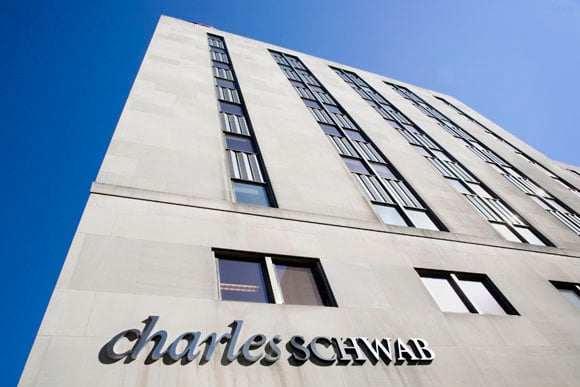Schwab's bundled 401(k), Index Advantage, will offer 40 low-cost funds covering about 16 asset classes
In a move sure to drive the trend toward lower-cost 401(k) plans, the Charles Schwab Corp. announced yesterday the launch of a new bundled 401(k) product that offers low-cost index funds.
Called Index Advantage, the plan will offer 40 funds covering about 16 asset classes, said Mike Peterson, a Schwab spokesman. The product will also have a bank-deposit savings option.
The mutual fund lineup will include products from Schwab as well as Vanguard, Dreyfus, Blackrock, TIAA-CREF, Principal and Columbia.
The movement toward lower fees is being helped by pending rules from the U.S. Department of Labor that will boost fee transparency.
“Schwab is appropriately reacting to the market,” said Greg Vigrass, president of Folio Institutional, which offers 401(k)s with ETFs.
“Investors are becoming more and more cost conscious, and anything that lowers costs to small companies is a good thing,” said Peter Philipp, an adviser with Cambridge Investment Research Inc. who manages about $100 million in 401(k) assets.
Schwab expects to land its first client for the new plan later this quarter.
Similar to Schwab’s existing bundled 401(k) packages, Index Advantage is not available to the independent RIAs who custody at Schwab.
Employers using Index Advantage will also have the option of providing employee participants with a self-directed brokerage account.
Schwab’s new offering could compete well against legacy plans that tend to have limited indexed options.
“A lot of older plans [have] one index option, and that is it,” said Jeff Elvander, chief investment officer at the Retirement Plan Advisory Group, a consulting firm whose 400 members handle 22,000 company plans with $90 billion under administration.
“For our client base [of advisers], we have recommended a three-pack” of index funds covering U.S. equities, international equities and fixed income, he said.
“That’s where index funds have the most value — gaining broad market exposure,” Mr. Elvander added.
Many plan employers have chosen higher-cost active funds that pay trail fees to administrators, thereby eliminating that cost for the company, observers said.
Details on Schwab’s pricing for Index Advantage were not available.
“I would think with [Index Advantage] those costs would be separate,” Mr. Philipp said, and paid by the plan sponsor or charged to employees.
“But that’s preferable to revenue sharing because it makes the cost more transparent,” he said.
Not everyone is a fan of the index-fund approach with 401(k)s.
Schwab’s index-only plan is a “marketing gimmick,” said R. Allen Vaughan, founder of The 401k Advisory Group, Inc., which manages about $27 million in 401(k) assets.
“The weakest link [in a plan] really is at the plan [adviser] level,” Mr. Vaughan said. “The big thing that makes a plan work is engagement by employees.”
Mr. Vaughan uses some ETFs in 401(k)s, but prefers good active managers.
Index Advantage will offer an advice option through GuidedChoice Asset Management, Inc., a third-party provider of investment advice and planning tools to retirement plan participants.
Only about one in 10 employees takes advantage of professional advice today, Schwab said in a statement, despite evidence that advice helps to boost savings rates.
The company is also developing a version of Index Advantage that will use only exchange-traded funds. The ETF-only platform will be available sometime next year, and is expected to have even lower costs, Mr. Peterson said.
The Index Advantage offering comes from Schwab Retirement Plan Services, Inc., a 401(k) provider to approximately 1.5 million workers with about $90 billion under administration.







